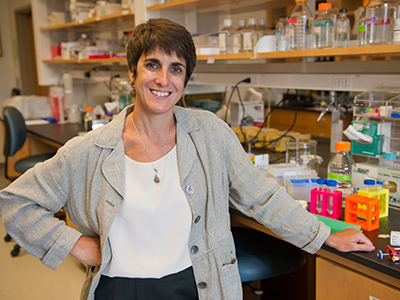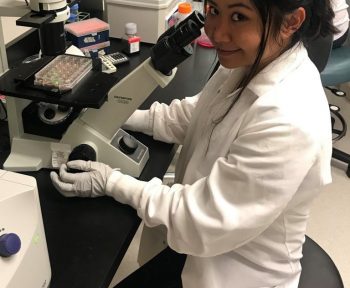Diversity in science matters to breakthroughs.
When more scientists with varied backgrounds and experiences fill laboratories and collaborate on teams, outcomes in innovation and discovery surpass those of less diverse scientific groups, according to the National Institutes of Health (NIH).

Sandra Hewett, the Beverly Petterson Bishop Professor of Neuroscience and professor of biology in the College of Arts and Sciences, believes in the power that diversity brings to research and recently built more capacity in her lab with an NIH grant for $39,078 to promote diversity.
The NIH’s Research Supplement to Promote Diversity in Health-Related Research grant will support the work of Regina Catague ’18 for one year in Hewett’s lab. Catague, who graduated last May with degrees in biology and neuroscience, had worked in Hewett’s lab during her undergraduate years and completed her honors capstone, as a member of the Renée Crown University Honors Program, through her lab work.
The NIH awards the supplements to support research grants with additional funding to improve the diversity of the research workforce by recruiting and supporting students, postdoctorates and eligible investigators from groups underrepresented in health-related research.
Hewett is the principal investigator of a five-year, $1.7 million grant award from the NIH’s National Institute of Neurological Disorders and Stroke. Her research looks at the origins of brain disorders, including epilepsy and stroke.
The diversity supplement grants are part of the NIH’s strategy to continue to develop the high quality of scientific human capital—built from a pool of scientists with diverse backgrounds, who bring different perspectives, creativity and individual enterprise to address complex problems.
Hewett calls the need for diversity in science “a national imperative.”
“It’s important that the sciences reflect our society,” Hewett says. “I fell in love with science and I want people who are drawn to the sciences to fully immerse themselves in the lab and their education without having to worry about money.”
Hewett is impressed with Catague’s work. “Regina is interested in how stress affects specific cells—astrocytes—the most populous cells in the brain,” Hewett says. Catague is looking at how a certain protein that is expressed by astrocytes is modified under certain internal or external stress conditions.

“Continuing in Dr. Hewett’s lab gives me the opportunity to expand on the project I began during my undergraduate years—currently, I am testing whether the adaptation of astrocytes to an external stressor can provide protection against subsequent exposure to lethal stress,” Catgue says. “I also am mentoring several undergraduates, paying it forward by teaching students various lab techniques and passing down other crucial knowledge that they will need to start their own projects. Finally, I am using my gap year to bolster skills that will prepare me for matriculation into a physician-scientist program.”
Catague is the fifth student in Hewett’s lab who has been supported with an NIH diversity supplement.
“This supplement helps promote a more intensive mentored scientific experience for persons who are from communities underrepresented in science,” Hewett says. “It is my hope that by providing an in-depth laboratory experience, these top-notch students will see science as a viable career option. Also, increasing gender and racial diversity in science can only strengthen the greater scientific workforce.”
